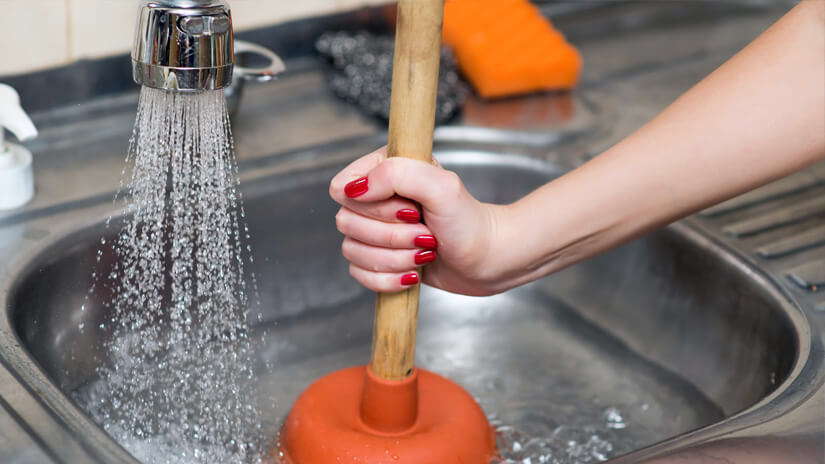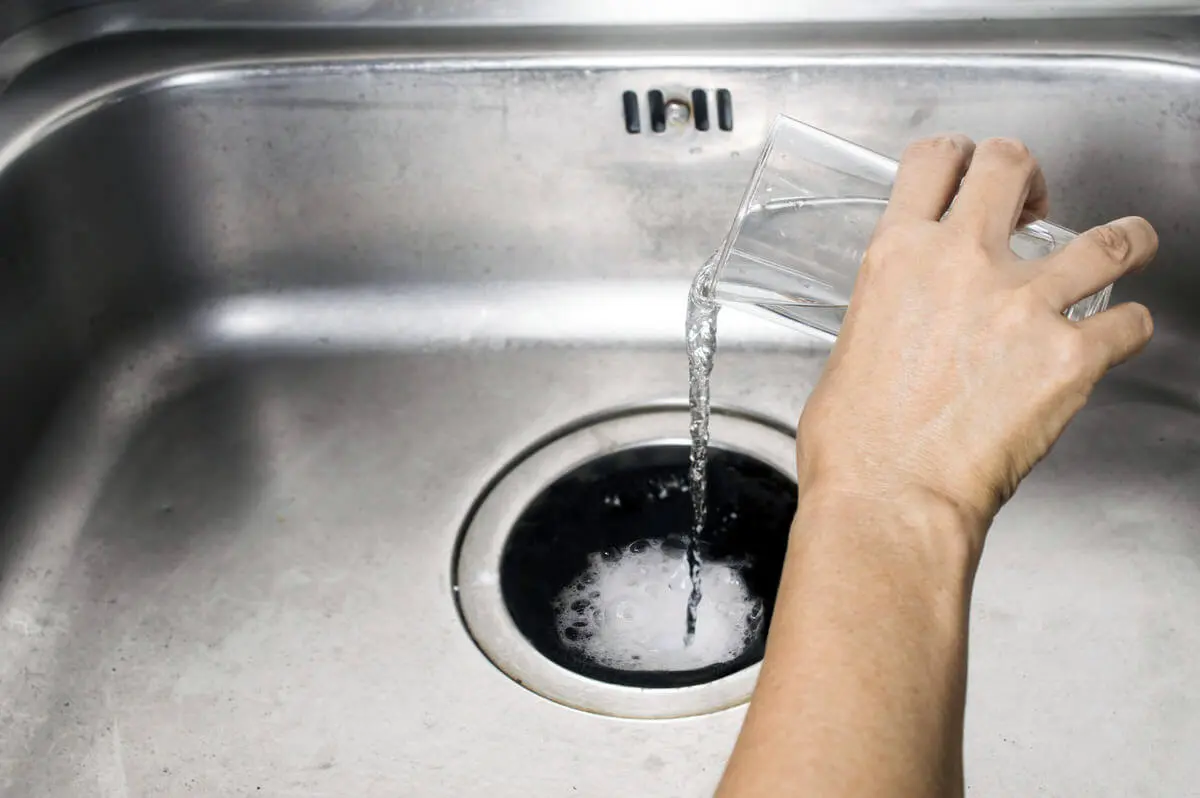Clogged drains are one of the top plumbing issues that residents face. You are left with a smelly and messy environment, whether a blocked kitchen sink or a slow-draining bathroom sink. There is also the risk of other issues affecting your plumbing that you are unaware of.
It’s tempting to grab a 'miracle in a bottle’ like liquid drain cleaners for those tough blockages—be it hair, soap, grease or food. But hold on a moment; do you know what’s going down your pipes and eventually into the city’s water system? The market is flooded with options like caustic, oxidising, and acid drain cleaners. It’s worth doing some research to find out which one might actually solve your specific problem.

Why Do Drains Block Up?
Clogs in the sink and clogged drains can occur for several reasons. The most common cause is an obstruction in the pipework that stops the water from flowing smoothly through your pipes. Your kitchen sink is easily clogged as much food preparation and cleaning is done there. And other drainage systems can become obstructed through daily use. Products and items that block the drain are:
Hair
You lose a lot of hair naturally throughout the day. When you wash your hair, mainly if the strands are long, they get washed down the drain and become tangled in the walls of the pipes. Over time, the hair becomes knotted and creates a plug.
Grease
Another culprit for clogged drains is grease. When washing up with shampoo or body wash, residue can head down the drain and gradually cling to your pipes. If you overdo it on these products, your plumbing might not be able to cope.
Trapped Food Particles
During food preparation, you may accidentally wash away pieces of food. You may think washing away some rice grains is ok because they are small. But over time, that food will get stuck and plug up the pipe walls, causing more food and other material to become lodged.
Cooking Oil
Fats and oils work with heat. When these cooking oils cool, they solidify. Once the hot oil touches the cool pipes, it will harden, cause a barrier, and eventually clog the sink. Think about this the next time you want to pour your leftover vegetable oil.
Soap
You use liquid soaps as part of your shower routine. But these products can become like sludge and create clogs in bathroom drains. Using too much liquid soap can damage your sink and pipework. Other items and objects will combine with the soapy product and clog the water channels.
Small Objects
Some small household objects can become stuck in toilet drains and other sink openings around your home. Rings and other smaller jewellery pieces risk slipping off fingers and getting accidentally washed down. Clogs will occur if the item is larger than the diameter of the drain pipe.
Too Much Toilet Paper
One of the biggest culprits of a blockage is too much paper being flushed down the toilet. Even though toilet paper is one of the few things that can be put down the line, using too much can impact the quality of your pipework.
Tree Roots
The primary reason for a blocked drain is tree roots growing inside your pipework. Tree roots thrive in moist environments. A cracked pipe has water escaping from the openings, and the roots will attach themselves and start growing. It won’t happen overnight, but the roots will grow and cause an obstruction over a long period, weakening the pipework.
Signs Of A Blocked Sink
Some indicators of a blocked drain are:
- Slow draining water
- Smelly drain area
- Toilet not flushing
- A gurgling noise coming from the drain opening
- Water backing up into the sink
- Pools of water in your yard
Notice any of these signs at home? You probably have a clog in your plumbing. Thankfully, you can tackle some of these blockages yourself. Several DIY drain-cleaning products on the market promise to help with minor blockages in toilets, bathrooms, kitchens, or even the laundry.

Do Chemical Drain Cleaners Damage Pipes?
Chemical drain cleaners or caustic drain cleaners are readily available in most supermarkets and home hardware stores. The primary purpose of liquid chemical drain cleaners is to move or break down foreign material or organic material lodged in the pipework. The harsh chemicals, usually sulfuric acid and sodium hydroxide, found in the cleaner supposedly help clear the channels from the inside.
You might know how drain cleaners generally function, but have you ever considered what exactly you’re flushing down the pipes? These solutions often contain harsh chemicals that can gradually corrode your plumbing.
Certain chemicals in different drain cleaners generate heat, transforming grease into a soap-like substance to break down clogs. But, depending on the type of pipes you have, these reactions might soften PVC pipes or corrode metal ones. This could lead to leaks and weakened water channels, potentially damaging your plumbing over time. Regular use could significantly reduce your plumbing’s lifespan.
What Do Plumbers Recommend To Unclog Drains?
You can adopt many other options and methods to clear clogged drains in your bathroom, kitchen, and laundry. You can also find what you require around your home. A plumber will always recommend these options first.
Vinegar And Baking Soda Mixture
One cup of baking soda, 1 cup of vinegar and 1 cup of hot water to make an environmentally safe drain cleaner. Slowly pour the hot water down the drain. Then, pour the baking soda, followed by the vinegar. Let the solution sit for at least 5-10 minutes. To achieve a good clean, 30 minutes is optimum. Flush the mixture down and slowly pour with hot water once more. You may leave it for 24 hours to ensure proper cleaning of hair and grease.
You can let this mixture sit overnight when using it as a toilet drain cleaner. The reaction will loosen any greasy build-up. This solution is not only environmentally friendly but also a safe alternative to harsher cleaning products, as it won’t damage your plumbing fixtures.
Plunger
You can purchase a drain snake or a plunger from most home improvement stores, and using a plunger is pretty straightforward. Choosing a plunger with the right size and shape would be best for your needs. The one that works best for a toilet is flange-shaped. It has a narrow opening that can fit snugly into the bowl drain opening.
For other drain openings, a flat-headed plunger is better. It will create the best seal around the opening.
Ensure you have a firm grip on the handle. Make up-and-down movements by pushing and pulling. It is essential to create a tight seal around the opening. Try this method a few times until you have cleared any obstruction. You can use a plunger for kitchen, bathroom, and laundry drain openings.
Are Chemical Drain Cleaners A Good Idea?
There’s little reason to rely on chemical drain cleaners. They might cause more harm to your drains and the environment than any good. This is especially true for older metal pipes, which are more susceptible to damage. Chemicals such as hydrochloric acid or oxidising agents in commercial cleaners can harm septic systems by wiping out beneficial bacteria. They can also tarnish your bathroom and kitchen fixtures. When faced with a stubborn clog, it’s best to call a licensed professional instead.
There are other options available that work just as well. So, do chemical drain cleaners work? They may be temporary, but for a permanent solution to clear waterways, contact a licensed plumbing team.
Need a Plumbing Service?
Call A Plumber
For extreme blockages, it is always best to call a professional plumber. They will help find the best way to clear clogs of all severities.
Plumbers come equipped with tools like high-pressure jet blasters and CCTV cameras to inspect your pipes for any serious damage. With their expertise, they can efficiently clear out clogs and offer tips and recommendations to keep your plumbing in top shape.














